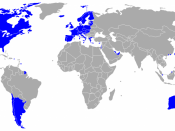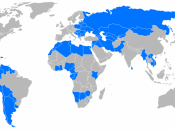Foreign Market Entry
Metro Corporation:
Technology Licensing Negotiation
1. Synopsis of the case.
Metro corporation and Impecina Construcciones S. A. of Peru had the negotiations about the licensing of the Petroleum Tank Technology. After the series of the negotiations they finally reached the agreement, however the Peruvian Government did not approve the 10 years agreement life and Metro appears to have resigned itself to the 5 years agreement.
Question 1. The role of Government intervention into the licensing negotiations.
Licensing negotiations have always been subject to the Government interventions of both developing and industrial advanced countries. This is due to the tremendous importance of the technology transfers for the country. It is obvious that the clever government policy in licensing can significantly improve the economical situation in the country and boost the technological development. The successful examples are, for instance, South Korea and Japan.
There are numerous reasons for government interventions into the licensing negotiations:
Development goals
Revenue goals
Balance of Payment objectives
Employment protection
Competition protection
Sectoral adjustment policies
Health and Safety protection
National security
International political goals
Development goals:
In recent years governments, especially those in developing countries, have encouraged inflows of technology as a major means of achieving national development goals.(Bradley,
1995) Thus the government interventions into the licensing negotiations are aimed to increase local industrial skills and ensure that technology will actually be transferred to local nationals and there are no restrictions on using the technology after expiry of the agreement.
Government of the recepient country also encouraging own R&D in the country by making sure that there are no:
Restrictions on introducing similar technology during the implementation of the joint R&D.
Restrictions on closely-related field of R&D.
Restrictions on same field of R&D after completion of the joint R&D.
Restrictions on future R&D on joint...


